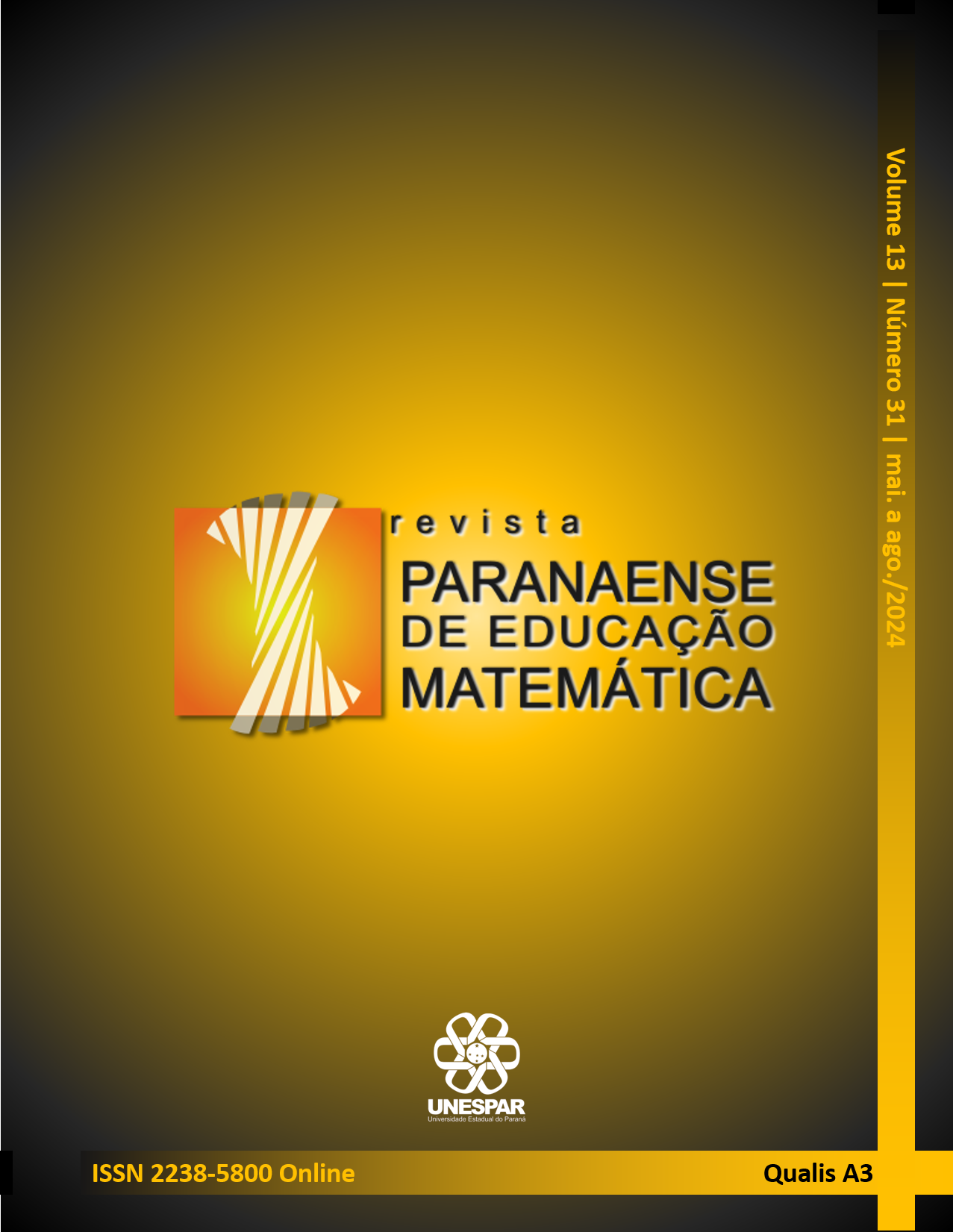DEVELOPMENT OF FINANCIAL SKILLS THROUGH MATHEMATICAL MODELING: A CURRICULAR PROPOSAL FOR BASIC EDUCATION
uma proposta curricular para a Educação Básica
DOI:
https://doi.org/10.33871/rpem.2024.13.31.8931Abstract
This article aims to show the importance of the study, which goes beyond teaching Financial Mathematics as a basic subject in the school curriculum. We seek to raise awareness among our students about Financial Education through mathematical models and basic concepts. Currently, it is observed that a large part of the Brazilian population is in debt and has problems with their finances. Therefore, by enabling a curricular teaching proposal, which aims to investigate the impact of mathematical modeling on teaching financial skills in basic education, analyzing its effect on the development of students' financial skills, their motivation to learn mathematics and their ability to apply financial concepts in everyday situations, we hope to minimize these rates in the near future, making our students increasingly aware of their financial attitudes. Thus, we started the project by learning about the history of financial Mathematics, followed by an analysis of Financial Education, where we will see different sources of study. We will also meet major contributors to the use of Mathematical Modeling in the classroom. And finally, we discuss some mathematical models that can be applied to the subject in question. Improving mathematics classes in Basic Education is a challenge that brings several positive effects, as numerous significant contributions can be seen after implementing the project, such as the development of a deeper understanding of financial issues. Therefore, these activities go beyond academic training, as they also contribute to the citizenship training of students.
Keywords: Teaching Mathematics. Financial education. Mathematical Modeling. Curriculum Proposal.
Downloads
References
ALMEIDA, L. M. W.; DIAS, M. R. Um estudo sobre o uso da modelagem matemática como estratégia de ensino e aprendizagem. Bolema: Boletim de Educação Matemática, Rio Claro, n. 22, p. 19-35, 2004.
AMADEU, J. R. A educação financeira e sua influência nas decisões de consumo e investimento: proposta de inserção da disciplina na matriz curricular. 2009. 92 f. Dissertação (Mestrado em Educação) – UNOESTE, Presidente Prudente, SP, 2009. Disponível em: http://bdtd.unoeste.br:8080/tede/handle/tede/820. Acesso em: janeiro 2024.
BASSANEZI, R. C. Ensino-aprendizagem com Modelagem Matemática. 2ª ed. São Paulo: Contexto, 2004.
BASSANEZI, R. C. Modelagem Matemática: teoria e prática. São Paulo: Contexto, 2015.
BORGES, P. A. P. e NEHRING, C. M. Modelagem matemática e sequências didáticas: uma relação de complementaridade. Bolema. Rio Claro, Ano 21, n.30, pp. 131-147, 2008.
BRASIL. Ministério da Educação. Secretaria da Educação Básica. Base Nacional Comum Curricular. Disponível em: http://basenacionalcomum.mec.gov.br/. Acesso em: maio de 2023.
CAMARGO, R. C. Matemática Financeira e Educação Financeira no Ensino Básico: uma proposta para atividades em sala de aula. Dissertação (Mestrado) - Faculdade de Ciências da Universidade Estadual Paulista “Júlio de Mesquita Filho”. Programa de Pós-Graduação Mestrado Profissional em Matemática em Rede Nacional, Bauru 2022. Disponível em: https://sca.profmat-sbm.org.br/profmat_tcc.php?id1=6781&id2=171055322. Acesso em: 28 maio 2023.
COSTA, E. A. da S. Educação financeira uma experiência no ensino básico. Dissertação (Mestrado) - PROFMAT da UNIRIO, Rio de Janeiro 2019. Disponível em: https://sca.profmat-sbm.org.br/profmat_tcc.php?id1=4665&id2=150480797. Acesso em: maio 2023.
COSTA, F. de A. Ensino matemática por meio da Modelagem Matemática. Ensino da Matemática em Debate, [S. l.], v. 3, n. 1, 2016. Disponível em: https://revistas.pucsp.br/index.php/emd/article/view/29005. Acesso em: 2 fev. 2024.
CRESWELL, J. W. Projeto de Pesquisa: métodos qualitativo, quantitativo e misto. Trad. de Magda Lopes. Porto Alegre: Artmed, 2010.
CRESWELL, J. W. Projeto de pesquisa: métodos qualitativo, quantitativo e misto. Tradução Luciana de Oliveira da Rocha. - 2. ed. - Porto Alegre: Artmed,2007.
CUMBERLAND, N. 100 coisas que milionários fazem. São Paulo: Astral cultural, 2019.
D'AMBROSIO, U. Da Realidade à Ação. Reflexões sobre Educação e Matemática. Ed. Universidade Estadual de Campinas, São Paulo. 1986.
FOSS, A. P. Educação Financeira: uma sequência didática para o Ensino Médio. Dissertação (Mestrado) - Universidade Federal do Rio Grande – FURG, Rio Grande/RS, 2022. Disponível em: https://sca.profmat-sbm.org.br/profmat_tcc.php?id1=6875&id2=171056758. Acesso em: 28 maio 2023.
GONÇALVES, J. P. A história da matemática comercial e financeira. Disponível em: https://www.somatematica.com.br/historia/matfinanceira4.php. Acesso em: janeiro 2024.
GOODE, W. J.; HATT, P. K. Métodos em pesquisa social. 4a ed. São Paulo: Nacional, 1972.
GRANDO, R. C. O conhecimento matemático e o uso de jogos na sala de aula. Tese. Doutorado. Universidade de Campinas. Campinas: Unicamp, 2000.
GRANDO, N. I.; SCHNEIDER, I. J. Matemática financeira: alguns elementos históricos e contemporâneos. Campinas-SP, Unicamp, 2010. Disponível em: https://periodicos.sbu.unicamp.br/ojs/index.php/zetetike/article/download/8646693/13595/20786. Acesso em: janeiro 2024
IFRAH, G. História universal dos algarismos: a inteligência dos homens contada pelos números e pelo cálculo. Rio de Janeiro: Nova Fronteira, 1997. v. 1.
KISTEMANN JR., MARCO AURÉLIO; COUTINHO, C. Q. E. S. ; FIGUEIREDO, A. C. . Cenários e desafios da educação financeira com a Base Curricular Comum Nacional (BNCC): Professor, Livro Didático e Formação. Em teia – Revista de Educação Matemática e Tecnológica Iberoamericana, 2020. Disponível em: https://periodicos.ufpe.br/revistas/emteia/article/view/243981. Acesso em: maio 2023.
KIYOSAKI, R. LECHTER, S. L. Pai Rico e Pai Pobre, Tradução Maria Monteiro, Rio de Janeiro-RJ: Editora Alto Books, 2000.
LIMA, C. B.; SÁ, I. P. de. Matemática Financeira no Ensino Fundamental. Revista Eletrônica TECCEN, v. 3, n. 1, p. 34–43, 2010.
MINAYO, M. C. s. Pesquisa Social: teoria, método e criatividade. Petrópolis: Vozes, 2002.
OCDE. Organização para a Cooperação e Desenvolvimento Econômico. Brasil: Estratégia de Educação Financeira, 2005. Disponível em: https://www.vidaedinheiro.gov.br/educacao-financeira-no-brasil/?doing_wp_cron=1670172048.6857900619506835937500. Acesso em: janeiro 2024.
REINHEIMER, M. Educação Financeira na Escola Básica: um experimento com Modelagem Matemática. Revista Educar Mais. Disponível em: https://lume.ufrgs.br/handle/10183/205520. Acesso em: janeiro 2024.
SADOVSKY, P. O ensino da Matemática hoje: enfoques, sentidos e desafios. São Paulo: Ática, 2010.
SCHIMIGUEL, J.; ROSETTI JUNIOR, H. Elementos Históricos da Matemática Financeira e Educação Matemática. CIAEM, 30 jun. 2011. Disponível em: https://xiii.ciaem-redumate.org/index.php/xiii_ciaem/xiii_ciaem/paper/viewFile/2420/413. Acesso em: 17 jan. 2024.
SKOVSMOSE, O. Cenários de investigação. Artigo Revista Bolema – Boletim de Educação Matemática, Rio Claro (SP), n. 14, 2000.
TEIXEIRA, S. de S. A Educação Financeira como tema transversal na educação básica. Dissertação (Mestrado) - Mestrado Profissional em Matemática em Rede Nacional do Instituto de Matemática e Estatística da Universidade Federal de Goiás, Goiânia 2020. Disponível em: https://repositorio.bc.ufg.br/tede/bitstream/tede/10692/3/Disserta%c3%a7%c3%a3o%20-%20Simone%20de%20Souza%20Teixeira%20-%202020.pdf]. Acesso em: maio 2023
VIDA E DINHEIRO. A Estratégia Nacional de Educação Financeira. 2017 AEF BRASIL. Disponível em: https://www.vidaedinheiro.gov.br/. Acesso em: maio 2023.
ZANETTI, M. D. T. Jogo dos Investimentos: a matemática financeira entrando na sala de aula do Ensino Médio sob a perspectiva do pensamento crítico e criativo. Dissertação (Mestrado) - PROFMAT da Universidade de Brasília, 2022. Disponível em: https://sca.profmat-sbm.org.br/profmat_tcc.php?id1=6860&id2=171054263. Acesso em: 28 maio 2023.
Downloads
Published
How to Cite
Issue
Section
License
Copyright (c) 2024 Revista Paranaense de Educação Matemática

This work is licensed under a Creative Commons Attribution-NonCommercial-NoDerivatives 4.0 International License.










